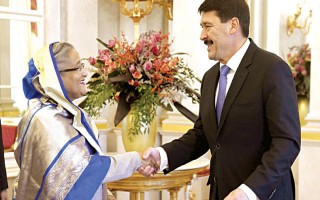PM demands global fund on water
Stressing the need for addressing issues like protection and utilisation of water resources comprehensively, prime minister Sheikh Hasina in Hungary on Monday shared a seven-point agenda with global leaders with a call for creating a global fund on water.
‘Financing is a critical issue to realise water-related goals and targets. I reiterate the need for creating a Global Fund on water to support research, innovation and technology transfer,’ she said while delivering her statement at the Budapest Water Summit, 2016.
The prime minister said water may intensify inequalities within and among nations in view of the growing population, rapid urbanisation and unplanned industrialisation. As such, issues like protection, conservation and utilisation of water resources need to be addressed comprehensively.
‘It wouldn’t merely eliminate inequality in access to water resources, but would also help bring peace, stability and security to the society as water has been the roots of many tension and conflicts across the world.’
Hasina said, ‘Water security guarantees a life of dignity and well-being for the people of this planet. To achieve this, we must work together and act now. Bangladesh is committed to playing its role.’
Sharing with the global leaders a seven-point agenda, Hasina said firstly the Agenda 2030 has sufficiently articulated the inter-linkages and interfaces between water and wider sustainable development architecture. ‘Hence, water should be the integral part of any development endeavour at national, regional and global level,’ she said.
She said millions of people around the world face difficulties to access safe drinking water and basic sanitation; given the fact that water supplies are neither adequate nor safe.
‘Special focus needs to be paid to people or group who is usually left behind: the poor, the women and the marginalised section of the society,’ she said.
The prime minister said thirdly water is one area where climate vulnerable countries are intensely challenged adding that there is an urgent need to build resilience to water related disasters.
She said, ‘Water challenges today, are not the scarcity of water in absolute term, rather its equitable distribution. Effective management of trans-boundary river water would serve a lasting and viable solution to this effect.’
The prime minister said water is also used for agricultural development and food security. ‘We must continue to develop less water-intensive varieties of crops and water efficient technologies.’
She said that there is a need for sharing with each other “our ‘light-house initiatives’ to further develop our knowledge, capacity, skill and technique in terms of development and efficient use of water resources.”
Hasina reiterated the need for creating a global fund on water to support research, innovation and technology transfer. ‘However, innovations and solutions should be such that it reaches to the people at the bottom.’
Extending her thanks to the government of Hungary to organise the summit on a topic that is precious to all of us, the prime minister said as regards Bangladesh, water occupies a central place to its culture, ethos, lives and livelihoods.
Hasina said Bangladesh has already met the MDGs for safe water while progress has also been made in the sanitation sector with around 65 per cent of the population having access to improved sanitation facilities.
‘We’re committed to ensuring safe drinking water for all and improved sanitation for at least 90 per cent of our population by the year 2021. Being one of the most climatically vulnerable countries, the government has been carrying out series of measures to address climate change adversities. Some of the initiatives like early warning system, cyclone shelters and coastal green belt have drawn global attention,’ she added.
The prime minister told her audience that Bangladesh faces unique challenges — abundance in water during monsoon and scarcity of water during dry season. The country’s vulnerability is further increased by the fact that 92 per cent of its surface waters originate from the outside of its border.
‘Sharing of trans-boundary river water is a complex issue. Two decades back, Bangladesh succeeded to enter into a long-term water sharing arrangement with India on the Ganges waters. Sub-regional cooperation on waters between Bangladesh, Bhutan, India and Nepal is also on the right track,’ she said.
President of Hungary János Áder made the opening statement while UN secretary general Ban Ki-moon and his all holiness, Bartholomew I, archbishop of Constantinople, New Rome, and Ecumenical Patriarch gave video messages.
- See more at: http://www.newagebd.net/article/3733/pm-demands-global-fund-on-water#sthash.aAbKwmCC.dpuf











